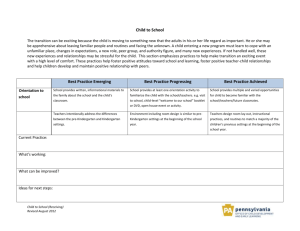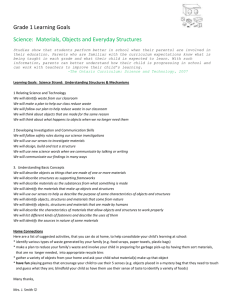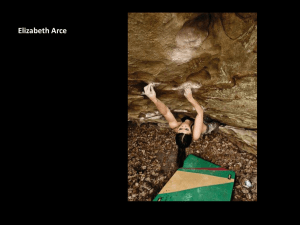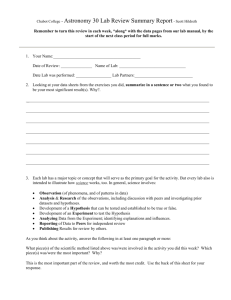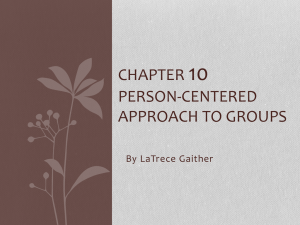File
advertisement
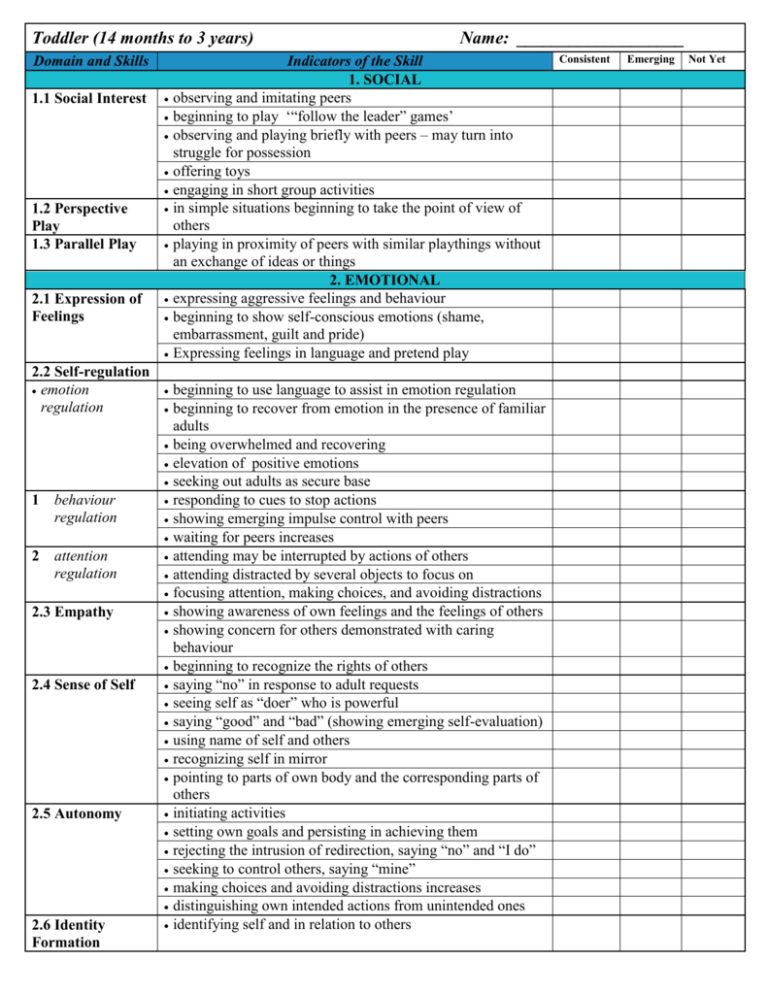
Toddler (14 months to 3 years) Domain and Skills 1.1 Social Interest 1.2 Perspective Play 1.3 Parallel Play 2.1 Expression of Feelings 2.2 Self-regulation emotion regulation 1 behaviour regulation 2 attention regulation 2.3 Empathy 2.4 Sense of Self 2.5 Autonomy 2.6 Identity Formation Name: ___________________ Indicators of the Skill 1. SOCIAL observing and imitating peers beginning to play ‘“follow the leader” games’ observing and playing briefly with peers – may turn into struggle for possession offering toys engaging in short group activities in simple situations beginning to take the point of view of others playing in proximity of peers with similar playthings without an exchange of ideas or things 2. EMOTIONAL expressing aggressive feelings and behaviour beginning to show self-conscious emotions (shame, embarrassment, guilt and pride) Expressing feelings in language and pretend play beginning to use language to assist in emotion regulation beginning to recover from emotion in the presence of familiar adults being overwhelmed and recovering elevation of positive emotions seeking out adults as secure base responding to cues to stop actions showing emerging impulse control with peers waiting for peers increases attending may be interrupted by actions of others attending distracted by several objects to focus on focusing attention, making choices, and avoiding distractions showing awareness of own feelings and the feelings of others showing concern for others demonstrated with caring behaviour beginning to recognize the rights of others saying “no” in response to adult requests seeing self as “doer” who is powerful saying “good” and “bad” (showing emerging self-evaluation) using name of self and others recognizing self in mirror pointing to parts of own body and the corresponding parts of others initiating activities setting own goals and persisting in achieving them rejecting the intrusion of redirection, saying “no” and “I do” seeking to control others, saying “mine” making choices and avoiding distractions increases distinguishing own intended actions from unintended ones identifying self and in relation to others Consistent Emerging Not Yet Domain and Skills 3.1 Receptive Language 3.2 Expressive Language words vocabulary questions conversation 4.1 Selfregulation attention regulation 4.2 Problem Solving 4.3 Cause-andEffect Exploration 4.4 Spatial Exploration 4.5 Spatial Problem Solving 4.6 Temporal 4.7 Symbolic Thought, Representation and Root Skills of Literacy pretend play representation 4.8 Memory Consistent Indicators of the Skill 3. COMMUNICATION, LANGUAGE AND LITERACY listening to stories responding to names of body parts, commands, and personal pronouns responding to longer sentences and commands combining words using common verbs and adjectives increasing vocabulary identifying functions of household items asking simple “what” and “where” questions observing and attempting to join conversations 4. COGNITIVE maintaining attention for increasing periods of time ignoring distracting variables setting goals and acting to achieve them solving problems in actions by trial and error seeking out adults to help meet goals using objects as tools to solve problems figuring out who is missing from a group by looking at those in attendance responding with joy to the predictable outcomes of exploration exploring the functions of objects; opening and shutting down exploring containment by putting objects in containers and by dumping them putting things together and taking them apart pushing obstacles out of the way using tools to overcome barriers using terms related to time “tomorrow” and “yesterday” understanding of “now” versus “later” emerges using objects to stand for other things acting out simple themes in pretend play: cooking, caring for babies identifying objects in photos pointing to objects in books on request identifying objects in books increasing memory capacity following routines establishing rituals Emerging Not Yet Domain and Skills 4.9 Sorting 5.1 Gross Motor balance jumping walking and running climbing riding toys 5.2 Fine Motor dressing eating tool use making a mark pincer grasp 5.2 Senses sensory exploration sensory discrimination sensory motor integration Indicators of the Skill sorting and labeling objects by characteristics, such as hard and soft or big and small matching items by function (e.g. spoon with bowl) 5. PHYSICAL Consistent Emerging standing on one foot taking a few steps on a raised surface jumping up and down on the spot jumping down from short heights balancing and coordination increase stopping while running improves climbing stairs one foot at a time climbing on climbing equipment and furniture moving riding toys forward by pushing with feet doing up buttons pulling up zippers using utensils and cup independently using toddler-safe scissors using palmar grasp to hold crayons and brushes and make scribbles scribbling expands to include lines and shapes turning pages of book adapting holding from palmar to pincer grasp using all senses in the exploration of properties and functions of objects and materials using all senses to identify and differentiate properties and materials coordinating senses with motor skills in increasingly complex ways using eye-hand coordination to string large beads on a pipe cleaner, do simple puzzles, pour, dump and fill Adapted from: “A Framework for Ontario’s Early Childhood Settings” Early Learning for Every Child Today Not Yet



